Dagobert is an indie hacker who created Logology.co with his wife to automate logo creation for users.
During the first few years, they struggled a lot to gain traction, so he turned to X.com to attract users. To do that, he started creating startup memes to connect with fellow indie hackers and product builders. This approach helped him gain more followers on X.com.
Meanwhile, he even created a course on how to grow followers on X.com. However, the pressure of entrepreneurship eventually caught up with him, forcing him to find a job alongside his startup.
After a year, he quit that job and started working on Launchday. Fortunately, he released it after six months—but this time, he didn’t rely on it solely. He took up an Account Executive job alongside it.
With this experience, he started making good sales commissions—earning around $12K+ in a month. But now, he has begun saying that “indie hacking is a cult.” Thankfully, he claims to have “freed” himself from it.
In reality, indie hacking was the place where he learned sales and marketing. Yet, he suddenly changed his opinion after getting comfortable with the structured corporate life and the steady commissions that came with it.
But the founder of Distribb.io gave him a fitting reply.
I’m sorry, Dago, but I can’t. You literally launched a platform to launch SaaS.
You made money with it. In a way, you pushed the indie hacking lifestyle with this project. Now you’re making a few bucks with your 9–5 and shitting on indie hacking.
Entrepreneurship isn’t a lottery. It’s a long-term game built for disciplined and driven people. If you gave up and you’re happy, good for you. But to me, you just gave up too early, and now you’re spreading your loser mindset around X.
I’ve been building stuff since 2016. It was hard, and sometimes it still is. But at some point, you understand the game. You accumulate skills and experience.
Then you win. Only people who give up lose. and you’re one of them. Your analogy doesn’t make sense at all. Lottery is luck. Entrepreneurship is hard and smart work over a long period of time.
This is what Nassim Table said about uncertainity.

In order to make a decision you need to focus on the consequences (which you can know) rather than the probability (which you can’t know) is the central idea of uncertainty.” – Nassim Nicholas Taleb
Taleb advised us to focus on consequences rather than on things we don’t know.
For example, you don’t know the probability of an earthquake tomorrow, but you do know the consequence if your house isn’t built to withstand one — total loss.
The same logic applies to business. You can’t predict the probability of success, but you can understand the consequences if things don’t turn out well.
Dago, for instance, might have benefited from keeping a secure job while pursuing his passion for building products on the side. Instead, he went all in and paid the price of probability — which rarely favors you in the early years of entrepreneurship.
Instead of giving up after the turmoil, he could have made his decision by weighing the consequences rather than relying on uncertain probabilities.
